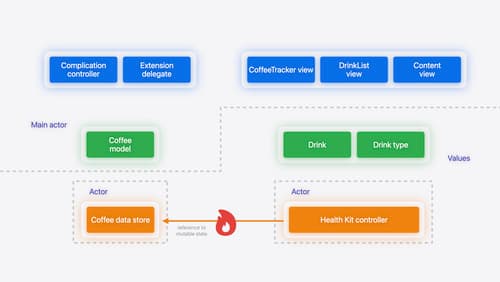Swift Dispatch methods
Asked on 2024-08-12
1 search
In Swift, dispatch methods refer to how function calls are resolved at runtime. There are two main types of dispatch in Swift: static dispatch and dynamic dispatch.
-
Static Dispatch: This occurs when the compiler knows at compile time exactly which function is being called. Static dispatch is more efficient because it allows for optimizations like inlining and generic specialization. In Swift, calls to functions declared in protocol extensions use static dispatch.
-
Dynamic Dispatch: This is used when the exact function to be called is determined at runtime. Dynamic dispatch is necessary for polymorphism and is used for calls to protocol requirements. In Swift, if a method is declared in the main body of a protocol, the call to it uses dynamic dispatch.
For more details, you can refer to the session Explore Swift performance (05:54) where these concepts are discussed.

Migrate your app to Swift 6
Experience Swift 6 migration in action as we update an existing sample app. Learn how to migrate incrementally, module by module, and how the compiler helps you identify code that’s at risk of data races. Discover different techniques for ensuring clear isolation boundaries and eliminating concurrent access to shared mutable state.

What’s new in SwiftData
SwiftData makes it easy to add persistence to your app with its expressive, declarative API. Learn about refinements to SwiftData, including compound uniqueness constraints, faster queries with #Index, queries in Xcode previews, and rich predicate expressions. Join us to explore how you can use all of these features to express richer models and improve performance in your app. To discover how to build a custom data store or use the history API in SwiftData, watch “Create a custom data store with SwiftData” and “Track model changes with SwiftData history”.

A Swift Tour: Explore Swift’s features and design
Learn the essential features and design philosophy of the Swift programming language. We’ll explore how to model data, handle errors, use protocols, write concurrent code, and more while building up a Swift package that has a library, an HTTP server, and a command line client. Whether you’re just beginning your Swift journey or have been with us from the start, this talk will help you get the most out of the language.
